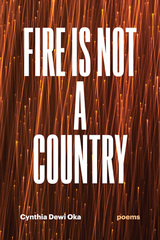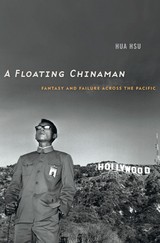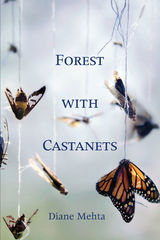7 start with F start with F

As she builds a lyric portrait of her own family, Oka interrogates how migration, economic exploitation, patriarchal violence, and a legacy of political repression shape the beauties and limitations of familial love and obligation. Woven throughout are speculative experiments that intervene in the popular apocalyptic narratives of our time with the wit of an unassimilable other.
Oka’s speakers mourn, labor, argue, digress, avenge, and fail, but they do not retreat. Born of conflicts public and private, this collection is for anyone interested in what it means to engage the multitudes within ourselves.

Who gets to speak for China? During the interwar years, when American condescension toward “barbarous” China yielded to a fascination with all things Chinese, a circle of writers sparked an unprecedented public conversation about American-Chinese relations. Hua Hsu tells the story of how they became ensnared in bitter rivalries over which one could claim the title of America’s leading China expert.
The rapturous reception that greeted The Good Earth—Pearl Buck’s novel about a Chinese peasant family—spawned a literary market for sympathetic writings about China. Stories of enterprising Americans making their way in a land with “four hundred million customers,” as Carl Crow said, found an eager audience as well. But on the margins—in Chinatowns, on Ellis Island, and inside FBI surveillance memos—a different conversation about the possibilities of a shared future was taking place.
A Floating Chinaman takes its title from a lost manuscript by H. T. Tsiang, an eccentric Chinese immigrant writer who self-published a series of visionary novels during this time. Tsiang discovered the American literary market to be far less accommodating to his more skeptical view of U.S.-China relations. His “floating Chinaman,” unmoored and in-between, imagines a critical vantage point from which to understand the new ideas of China circulating between the world wars—and today, as well.


During the early part of the Cold War, Japan emerged as a model ally, and Japanese Americans were seen as a model minority. From Confinement to Containment examines the work of four Japanese and Japanese/American artists and writers during this period: the novelist Hanama Tasaki, the actor Yamaguchi Yoshiko, the painter Henry Sugimoto, and the children’s author Yoshiko Uchida. The backgrounds of the four figures reveal a mixing of nationalities, a borrowing of cultures, and a combination of domestic and overseas interests.
Edward Tang shows how the film, art, and literature made by these artists revealed to the American public the linked processes of U.S. actions at home and abroad. Their work played into—but also challenged—the postwar rehabilitated images of Japan and Japanese Americans as it focused on the history of transpacific relations such as Japanese immigration to the United States, the Asia-Pacific War, U.S. and Japanese imperialism, and the wartime confinement of Japanese Americans. From Confinement to Containment shows the relationships between larger global forces as well as how the artists and writers responded to them in both critical and compromised ways.
![front cover of from unincorporated territory [hacha]](https://www.bibliovault.org/thumbs/978-1-63243-049-6-thumb.jpg)
![front cover of from unincorporated territory [lukao]](https://www.bibliovault.org/thumbs/978-1-63243-041-0-thumb.jpg)

Selected contributors. Dahlak Brathwaite, adrienne maree brown, Jeff Chang, Tameca Cole, Ofelia Esparza, Antoine Hunter, Nobuko Miyamoto, Wendy Red Star, Spel, Jose Antonio Vargas, Carrie Mae Weems, Hinaleimoana Kwai Kong Wong-Kalu
READERS
Browse our collection.
PUBLISHERS
See BiblioVault's publisher services.
STUDENT SERVICES
Files for college accessibility offices.
UChicago Accessibility Resources
home | accessibility | search | about | contact us
BiblioVault ® 2001 - 2024
The University of Chicago Press









